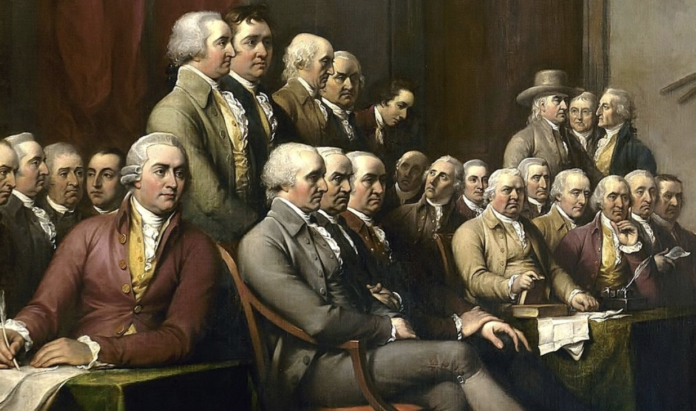![]()
In 1788, just one year prior to the founding of Georgetown University, a different cultural experiment was underway in the State of New York. Eighty-five long-form essays, the majority of which were published by the anonymous author Publius, graced the pages of The Independent Journal, the New York Packet and The Daily Advertiser.
From Oct. 1787 to April 1788, Alexander Hamilton, John Jay, and James Madison conducted a sweeping project to promote the new U.S. Constitution through these serial entries. Later known as The Federalist Papers, these essays represent a forgotten defense of the Constitution at the time of its ratification and provide modern audiences a glimpse into the thought processes of the Founding Fathers.
However, the impact of these documents on our current society seems minimal. While they received a shoutout in Lin-Manuel Miranda’s Hamilton — “and Hamilton wrote the other 51” — the fact remains that The Federalist Papers are not an active part of educational curricula around the country.
The College Board, in their requirements for AP U.S. Government and Politics, have students read Federalist #10, #51, #70, and #78, but not all 85 essays in the collection. In July 2012, Associate Supreme Court Justice Antonin Scalia conducted an interview with C-SPAN, in which he relayed his concern that young Americans were not reading The Federalist Papers. Scalia remarked:
“I am always astounded — I can ask a group of law students, ‘How many of you have read the Federalist Papers,’ and you know, it’s maybe 6 percent or something like that. You should not be able to get out of high school without being exposed to what the Framers thought they were doing… [The Founding Fathers] were not doing it by the seat of their pants. They had experience in various systems of government in this country and abroad and from that experience they deduced, or they applied what James Madison called at the convention.”
As a student interested in the American legal system, I decided to explore these foundational texts, focusing in particular on essays outside the College Board curriculum. I asked myself: what role did The Federalist Papers have in maintaining the efforts of the recently independent colonies? And what lessons can we learn from these documents in the present day?
While Publius in Federalist #1 lays out the organization of his subsequent essays, I found that the collection can also be categorized into two main groups. The first, from Federalist #1 to #22, discusses the deficiencies of the Articles of Confederation, warning of the dangers of political fragmentation. The second, from Federalist #23 to #85, discusses their interpretation of the new Constitution as providing energy and authority to the emerging government.
The possibility of secession or strife between the American states was a palpable concern of the Founding Fathers, as well as an unfortunate aspect of our modern society. Upon the failure of the Articles of Confederation to provide for the country’s general welfare, some states considered it proper to leave the union, instead dealing with their respective states and countrymen alone. Much of Federalists #2-8 are devoted to these concerns, arguing that a united government can provide states security and prosperity, allow international powers to craft fairer terms of engagement, deter constant conflict, and prevent domestic power imbalances. As the authors suggest, the states’ geographical proximity will ensure constant political engagement and it is better to be united than divided.
According to polling from The Economist, approximately 40 percent of Americans believe a civil war is likely, given divisions in the current political climate. Should such a domestic crisis come to fruition, in addition to the human and emotional losses, Americans would lose the fundamental attributes that protect our society: a strong navy as articulated in Federalist #11, economic development described in Federalists #12-14, and a federalist relationship where state powers are reserved in Federalist #17. Drawing heavily on European history, Hamilton rightly points out in Federalist #21 that “the genius and fate of other confederate governments” became failed states with no legacy and/or political purpose. To befall the United States to the fate of those disjointed in medieval Europe, after centuries of promise, would devastate our national psyche and identity.
As readers approach the second section of The Federalist Papers, discussions of fragmentation continue as the new Constitution takes shape. Federalist #23 is the start of a fourteen-paper discussion on the necessity of a strong central government to provide much of the aforementioned faults of the Articles of Confederation. Issues like common defense, raising armies, collecting taxes, and formulating a national identity take center stage as a necessity for the country to thrive. Should Americans give in to the impulses of fragmentation and dissociation, they will lack a cohesive government to provide for their welfare.
The remainder of The Federalist Papers discusses the Constitution in greater detail, including the pitfalls that interfere with the structure. The “Mixed Government” provided in Federalist #40 allowed for the shared power and legal authority between the state legislature and the budding federal government upon observing the variety of state interests at the Constitutional Convention.
Federalists #44 to 46 warned the populace against providing individual states or branches with more power than others since that would undermine the system that values unity. As such, the expressed purpose of each branch and right in the Constitution was thought of carefully, with recognition of its limitations and consequences.
Most poignantly, some essays offer interesting commentary on current political issues. Federalist 56 could justify enlarging the House of Representatives, as Publius believed thirty-thousand citizens to a representative was adequate. While voter eligibility and the total U.S. population have changed dramatically since The Federalist Papers were published, the idea that current representatives should represent nearly 800,000 people (more than the population of colonial states) would not fall in line with Publius’s theories. Federalist #53 states “that where annual elections end, …tyranny begins,” and Federalist #60 asserts that state legislatures have no right to unilaterally control federal elections.
As the Supreme Court deliberates on Moore v. Harper, the “independent state legislature theory” seems to carry little ideological weight concerning the Founding Fathers. Finally, Federalist #78 sees Publius advocate for lifelong terms for Supreme Court justices, as these terms would be the only way to achieve political neutrality. As Americans consider giving justices term limits or rotating them through appellate courts, they may find a situation in which new justices seek to make fast changes to the American legal system instead of advocating caution.
Overall, this restraint to the civil process tempers those who wish to subvert it, as the Founding Fathers have already grappled with issues crucial to current political discourse.
Overall, it would be incorrect to suggest the opinions and ideologies of the Founding Fathers are infallible; I strongly condemn Publius’ assertion in Federalist #54 that Black Americans ought to be considered “mixed characters of person and property,” as well as much of the rhetoric related to social customs in eighteenth-century America and Europe. At the same time, however, we should also look towards the Founding Fathers’ enduring wisdom on matters of governmental organization.
The success of our two-hundred-and-fifty-year experiment lies in our capacity for restraint and the ability of our nation to make responsible, incremental decisions without succumbing to the passions of the political moment. Destroying our institutions destroys the very legacy these authors left for this nation. We ought to honor their capacity for meticulousness, their capacity to dream, and crucially, their capacity for error. It was a privilege to engage with this time capsule of ideology, learning lessons instrumental to our nation’s ability to govern.












